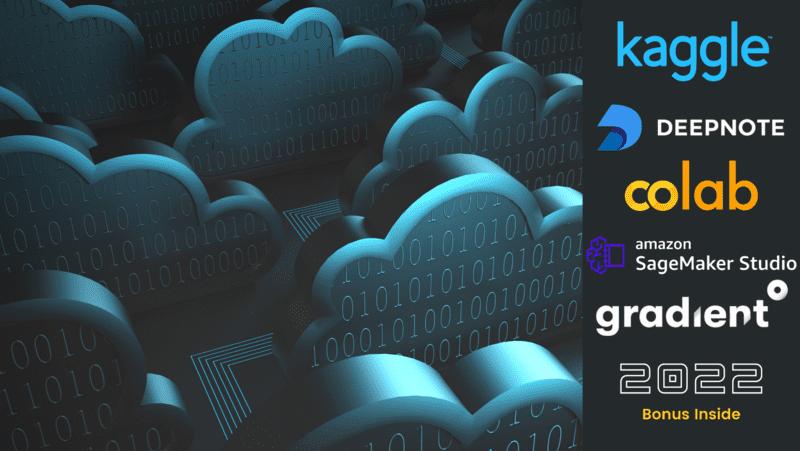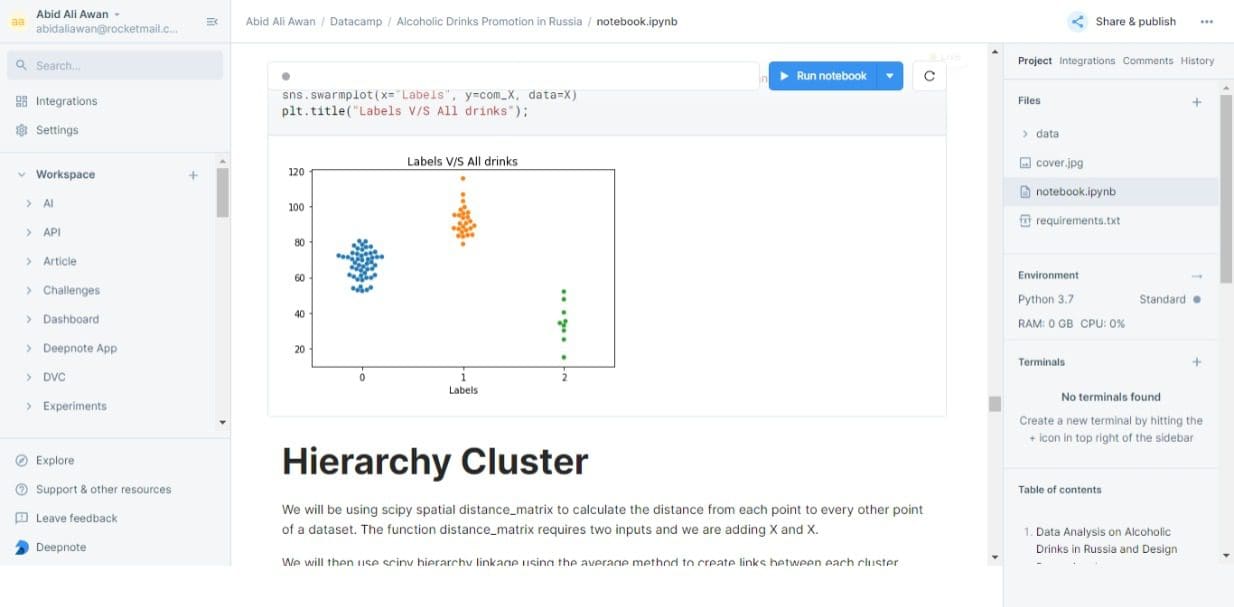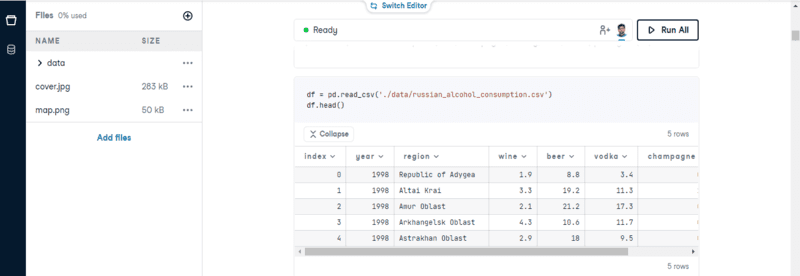Top 5 Free Cloud Notebooks in 2022
Create and collaborate on data science projects or train machine learning models using free cloud Jupyter notebook platforms. You get a hassle-free IDE experience and free compute resources.

Image by author
I will be sharing my experience with the best cloud notebooks and explaining why they are in the top five. The cloud integrated development environment (IDE) or cloud Jupyter Notebooks has changed my whole perspective about working on data science projects. These platforms comes with pre-installed Python or R packages that are useful for most of the project, and within a few seconds, you are ready to start working on the project.
It usually takes me more to load VSCode on my laptop, and then I have to install missing packages. Other than free compute and pre-build environments, cloud notebook platforms offer third-party tool integrations, collaborations, and publication options. In this blog, we are going to learn about the best features of the top five cloud notebooks and how you can use them to improve your current data science development stack.
1. Kaggle

Image from Kaggle
Kaggle provides a complete ecosystem for data science and machine learning. The platform is interactive and community driven, where students and professionals contribute by uploading datasets, creating notebooks, sharing ideas, and participating in competitions. Kaggle also offers free unlimited CPU, 30 hours GPU, and 20 hours TPU per week. Apart from that they provide unlimited public and 100 GB private data storage. Kaggle is the ultimate tool for experimenting on machine learning projects and sharing the solutions.
Features
- Free CPU, GPU, and TPU
- Free Storage
- Notebook scheduled run
- Open source dataset and notebooks
- Python & R
- Google Cloud integrations
- Versioning
2. Deepnote

Image from Deepnote
Deepnote is love. I do all of my work tasks on it. It is the best cloud notebook platform for any type of data science project. I have ranked it 2nd because the platform only provides free CPU. Both Kaggle and Deepnote have been improving UI and adding features regularly, so it was hard for me to decide on the 1st. Deepnote is a project-based notebook platform that offers multiple database integrations and various key features for improving user experience. You can experiment on a data science project, create a custom environment, live collaboration, and publish your work. Deepnote is one stop-shop for all of your data science projects.
Features
- Free CPU and storage
- Notebook scheduled run
- Python, R, and Custom Environment
- Database integration
- Web Server for running Streamlit, Tensorboard, etc
- Real-time collaboration
- Publishing and sharing Notebook
- Notebook cell to WebApp
- Versioning
3. Google Colab

Image from Colab
Google Colab is quite famous among machine learning researchers and data scientists. It is simple and provides free GPU and TPU. I use Colab for a quick code run or to try other people's research works. Most of the repositories or research papers attach links to Google Colab to test and validate the results. I think the simplicity and powerful computing make it quite attractive for people to share and experiment on machine learning projects. You get temporary storage, free but unreliable GPU and TPU, and integration with other Google cloud products such as Drive.
Features
- Free CPU, GPU, and TPU
- Free Temporary Storage
- Only Python
- Google Cloud integrations
- Improved Jupyter UI
- Fast loading
4. Amazon SageMaker Studio Lab

Image from Studiolab
Amazon SageMaker Studio Lab is a new contender, and it is a high-quality product. The platform is quite simple to navigate. It provides 12 hours of free CPU and 4 hours of GPU for every session. The Studio Lab architecture and interface is based on Amazon SageMaker Studio with limited features. You only get free compute, storage, and all of the capabilities of Jupyter lab and its extensions.
Features
- Free CPU and GPU
- Free limited Storage
- Only Python and Custom Environment
- Fast and simple UI
- Jupyter extensions
- High Ram
- Educational content
5. Paperspace Gradient

Image from Gradient
Gradient by Paperspace is a cloud platform that focuses on the machine learning domain. It provides end-to-end MLOps solutions including model and data storage, deployment solution, and monitoring. It also provides free CPU and GPU for notebooks. The user interface is quite beautiful and it's easy to navigate. Why is it on the 5th? The GPU is not available most of the time and the UI is buggy and slow. There are several paid features that are offered free by other platforms. Gradients have huge potential to become market leader but due to slower updates and development, they are lagging behind.
Features
- Free CPU and GPU
- Free limited Storage
- Only Python environment
- Modern UI
- Limited versioning
- End-to-end machine learning solution
Bonus

Image from DataCamp Workspace
DataCamp Workspace is another new contender in the cloud notebook market. It is interactive and offers all of the Jupyter notebook features. You are limited to CPU, but 90 percent of data science projects require CPU. The Workspace is part of the DataCamp courses ecosystem, where you can work on tutorial projects and participate in competitions. The platform also allows you to create a profile and lets you share your notebook in the form of articles. I am a big fan of DataCamp, and I think in the future, Workspace will be included in the top five due to its simplicity and integration with other DataCamp products.
Features
- Free CPU
- Free limited Storage
- Interactive UI
- Sharing & Publication
- Integrate with DataCamp
- Integrated with Git, Datasets, and templates
Abid Ali Awan (@1abidaliawan) is a certified data scientist professional who loves building machine learning models. Currently, he is focusing on content creation and writing technical blogs on machine learning and data science technologies. Abid holds a Master's degree in Technology Management and a bachelor's degree in Telecommunication Engineering. His vision is to build an AI product using a graph neural network for students struggling with mental illness.
